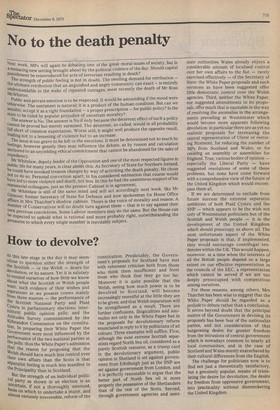No to the death penalty Next week, MPs will again
be debating one of the great moral issues of society, but in a menacing new setting brought about by the political violence of the day. Should capital Punishment be reintroduced for acts of terrorism resulting in death? . The strength of public feeling is not in doubt. The swelling demand for retribution — t e ultimate retribution that an anguished and angry community can exact — is entirely understandable in the wake of repeated outrages, most recently the death of Mr Ross rsilcWhirter.
Public and private emotion is to be respected. It would be astounding if the mood were otherwise. The sentiment is natural; it is a product of the human condition. But can we sensibly accept it as a right foundation — a proper prescription — for public policy? Is the State to be ruled by popular prejudice of uncertain morality? The answer is No. The answer is No if only because the deterrent effect of such a policy cannot be proved but merely surmised. The deterrent, so-called, would in all probability _fall short of comn-ion expectation. Worse still, it might well produce the opposite result, leading not to a lessening of violence but to an increase. _ The issue is too grave to be left to the emotions. It must be determined not so much by feelings, however greatly they may influence the debate, as by reason and calculation anchored to an unyielding ethical commitment that cannot be abandoned for the sake of expediency. Mr Whitelaw, deputy leader of the Opposition and one of the most respected figures in Public life for many years, is clear about this. As Secretary of State for Northern Ireland, he could have invoked treason charges by way of activiting the death penalty. He chose not to do so. Personal conviction apart, in his considered estimation that course would have led to more violence and death, not less. In this he had the unanimous support of his ministerial colleagues, just as the present Cabinet is in agreement. Mr Whitelaw is still of the same mind and will act accordingly next week, like Mr Gilmour former Secretary of State for Defence and now spokesman for Home Office affairs in Mrs Thatcher's shadow cabinet. Theirs is the voice of morality and reason. A number of Conservatives will no doubt turn against them — that is to say against their ° Lwn previous convictions. Some Labour members may do the same. But the House can er expected to uphold what is rational and more probably right, notwithstanding the pu essures to which every single member is inevitably subject.

































 Previous page
Previous page